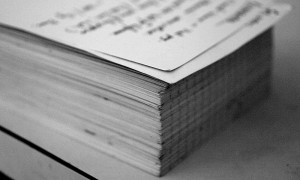 So, I was thinking about a blog I saw today on The New York Times titled “Why I Taught Myself to Procrastinate” by Adam Grant. I find it interesting that someone has to learn to procrastinate. Grant admits that he is highly organized, planning his work ahead and accomplishing his tasks in plenty of time. Good for him. He had read about an experiment that explained that procrastinators may be more creative than planners. The result of the experiment was that while those who started the assignment immediately did well, they were not quite as clever or creative as those who had fooled around for a while before starting the project. I liked that outcome. The experiment was artificial, but nonetheless, the result was satisfactory. I should note here that Grant does not advocate procrastination to the point of the very last possible minute before a project or paper is due. He is merely suggesting that some procrastination is beneficial with the result being more creativity, and he decided to try a little procrastination in his own life. He found that the results of the experiment were true to some degree. I enjoyed reading this article, and I agree with Grant that a little procrastination may get the creative juices flowing, but I don’t advocate waiting until the night before the deadline.
So, I was thinking about a blog I saw today on The New York Times titled “Why I Taught Myself to Procrastinate” by Adam Grant. I find it interesting that someone has to learn to procrastinate. Grant admits that he is highly organized, planning his work ahead and accomplishing his tasks in plenty of time. Good for him. He had read about an experiment that explained that procrastinators may be more creative than planners. The result of the experiment was that while those who started the assignment immediately did well, they were not quite as clever or creative as those who had fooled around for a while before starting the project. I liked that outcome. The experiment was artificial, but nonetheless, the result was satisfactory. I should note here that Grant does not advocate procrastination to the point of the very last possible minute before a project or paper is due. He is merely suggesting that some procrastination is beneficial with the result being more creativity, and he decided to try a little procrastination in his own life. He found that the results of the experiment were true to some degree. I enjoyed reading this article, and I agree with Grant that a little procrastination may get the creative juices flowing, but I don’t advocate waiting until the night before the deadline.
I confess that procrastination is a way of life with me. I think it is with most people. People who have a plan and work the plan seem to be a little too organized, and, dare I say, boring to me. Because they “work the plan”, they have free time, maybe too much free time. I have found that some of the highly-organized crowd has little time for doing service project, helping out at church, or hanging out with a friend. They may lack spontaneity because they must schedule every activity. I think it is easier for these individuals
Frankly, I have tried to be efficient and timely, but somehow, I just don’t feel as creative as when I wait to start a little closer to the date. In my own experience, I know that I have to write something by a specific deadline, and I have an idea of what that will be, but I think that I have time so I shop, bake, read a novel, play Candy Crush on my phone, check my email and Facebook. I’m still thinking about my topic, which is never far from my mind. I take a jaunt to the library to see what books are available on the topic, but I find out that the books have to be ordered from a university library in the northern part of the state, so I will have to wait a week to pick them up. Okay, so I’ll see what else is in the library. Maybe I’ll take out an Elizabeth George crime thriller and a few DVDs to watch while I’m waiting for the books to come in.
Because the pressure is on, I start writing. I think that I will write what comes to my head first. I write and read and underline and take notes, and get a drink, and make cookies. I come back and revise after I watch a few episodes of Parenthood on Netflix, then I edit and re-edit. There is nothing wrong with that approach because while I am whipping up those cookies, another nifty idea comes to mind. Sometimes it helps to take breaks from researching or writing to refuel my energy by eating a few cookies or taking time to relax my brain. I have found that my brain is never really inactive. When I am working on a project, I think about it almost non-stop, even while I am throwing in a load of wash or vacuuming the floor.
Now, to be fair, Grant did say that the experiment seems to reveal that those who wait until the last possible minute are neither productive nor creative. I wouldn’t advise practicing extreme procrastination. It’s a little hard on the heart. So, while there is merit in being so well-prepared and being able to finish tasks long before they are due, these individuals tend to be more straightforward and linear, which translates to less exciting, at least in my book.
